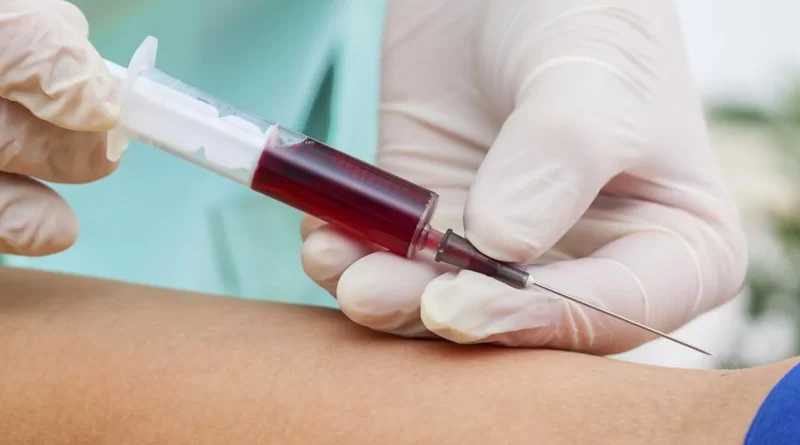New study suggests causal link between blood group, severe covid-19
A new study analyzed more than 3000 proteins to identify which ones are causal to the development of severe Covid-19. This is the first study to evaluate such a number of proteins for their connection to Covid-19 The conclusions of the study will provide an overview of new potential objectives for approaches to treat and prevent severe CIVID-19 The study was led by the Maudsley Biomedical Research Center (NIHR) of the National Institute of Health (NIHR) and was published in the journal, “Genetics Plos”.
The study used a genetic tool to exceed 3000 proteins. The researchers identified six proteins that may underlie an increased risk of severe Covid-19 and eight likely to contribute to protection against the severity of CIVID-19 One of the proteins (ABO) that has been identified as having a causal connection to the risk of developing CVIV-19 determines the blood groups, suggested that blood groups play an instrumental role in all of the serious persons of the serious. disease.
Around the author of the Institute of Psychiatry, Psychology and Neuroscience (IOPPN) King’s College London said, “We used a purely genetic approach to investigate a large number of blood proteins and establish that a Handle has causal links to development. COVID-19 Severe. As a result, this group of proteins, it is an essential first step to discover potentially valuable goals for the development of new treatments. Assessing how blood proteins are related to disease can help understand the underlying mechanisms and identify new potential goals to develop or reuse drugs. Protein levels can be measured directly from blood samples, but the conduct of this type of search for a large number of proteins is expensive and can not establish causal direction.
This is where genetics can play a role. Mendelian randomization, a method of comparing causal relationships between risk factors and health outcomes, the use of large sets of genetic data can assess the relationship between genetic variants related to exposure (in this case high levels. Individual blood proteins) and genetic variants related to the result of the disease (in this case, severe COVID-19) The author co-first author of Dr. Vincent Millischer of the Vienna Medical University explained: “The causality between the exhibition and the disease can be established because the genetic variants inherited from the parent to the offspring are randomly attributed to the design of how a randomized controlled trial attributes people to groups. In our study groups are defined by their genetic propensity at different levels of blood protein, allowing an assessment of the causal direction of high blood protein levels. The gravity of COVID-19 while avoiding the influence of environmental effects. “
The study examined two incremental levels of CVIV-19 gravity, hospitalization and respiratory support or death. Using data from a number of genome-wide association studies, researchers have found six proteins causally related to increased hospitalization or respiratory support / death due to COVID-19 and eight causal related to protection against hospitalization or respiratory protection The analysis showed some distinction in the types of proteins related to hospitalization and respiratory support / death, indicating that different mechanisms can be at work in these two stages of the disease.
The analysis identified that an enzyme (ABO) that determines the blood group was linked to both an increased risk of hospitalization and a respiratory support requirement. This supports the previous conclusions around the blood group association with a higher probability of death. Taken with previous research showing that the proportion of group A is higher in the positive people of COVID-19, this suggests that the blood group has a candidate for follow-up studies Dr. Christopher Hubel of IOPPN, King’s College London, said: “The enzyme helps to determine the blood group of an individual and our study is linked with a risk of hospitalization and the need for respiratory support or death. Our study does not connect with a specific blood group with a risk of severe Covid-19, but since previous searches have found that the proportion of Group has is higher in the positive people of COVID-19, this suggests that the Blood group A is more likely candidate to follow studies studies. ” Researchers have also identified three membership molecules as a result of a reduced risk of hospitalization and respiratory support requirement. As these adhesion molecules media the interaction between immune cells and blood vessels, these chimes with previous searches suggesting that Covid-19 late is also a disease involving the lines of blood vessels.
By identifying this suite of protein, the research has highlighted possible objectives that can be used for drugs that can help treat a serious CIVID-19. These will require another clinical survey that can be undertaken as part of the broader Covid Clinical Clinical Neuroscience Study (COVID-CNS), which investigated the causes of different aspects of COVID-19.
Gerome Breen, Professor of Genetics at IOPPN and author Co-last author of the article, said: “What we did in our study is a service list for the next research stage. On 1000 protein Bloods, we have tasted up to about 14 a form of causal connection to the risk of severe Covid-19 and has a potentially important avenue for new research to better understand the mechanisms of COVID-19 with an ultimate goal of developing new ones. treatments, but potentially preventative therapies. “




